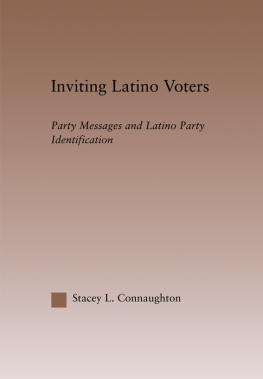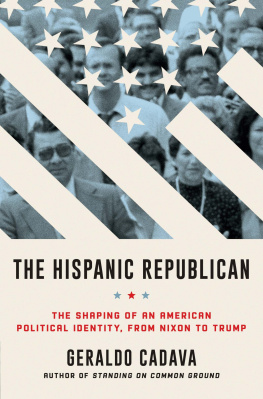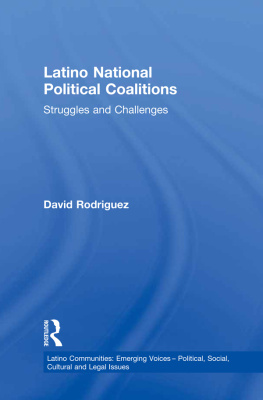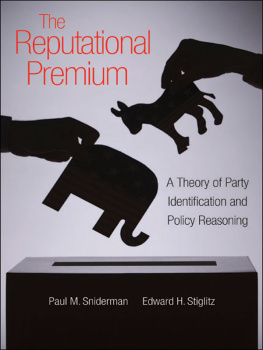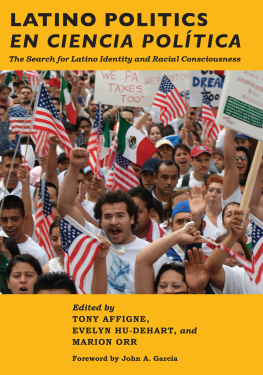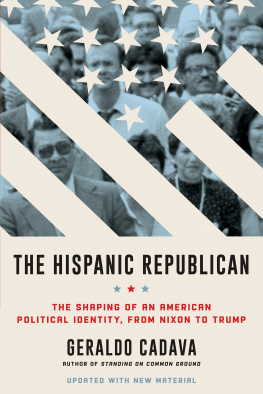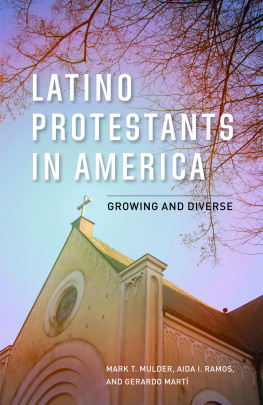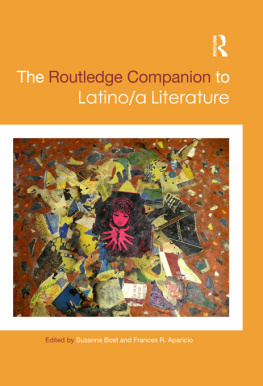LATINO COMMUNITIES
EMERGING VOICES
POLITICAL, SOCIAL, CULTURAL, AND LEGAL ISSUES
Edited by
Antoinette Sedillo-Lopez
University of New Mexico
A ROUTLEDGE SERIES
LATINO COMMUNITIES EMERGING VOICES
ANTOINETTE SEDILLO-LOPEZ, General Editor
SPANISH AND ACADEMIC ACHIEVEMENT
AMONG MIDWEST MEXICAN YOUTH
The Myth of the Barrier
Patricia MacGregor Mendoza
CHICANO EDUCATIONAL ACHIEVEMENT
Comparing Escuela Tlatelolco, A Chicanocentric
School and a Public High School
Elena Aragon de McKissack
LATINOS AND LOCAL REPRESENTATION
Changing Realities, Emerging Theories
Florence Adams
PUERTO RICAN NEWSPAPER COVERAGE OF
THE PUERTO RICAN INDEPENDENCE PARTY
A Content Analysis of Three Elections
Maria Cristina Santana
COLEGIO CESAR CHAVEZ, 1973-1983
A Chicano Struggle for Educational Self
Determination
Carlos S. Maldonado
LATINOS IN ETHNIC ENCLAVES
Immigrant Workers and the Competition for
Jobs
Stephanie Bohon
TELLING OUR STORIES
The Lives of Midwestern Latinas
Theresa Barron McKeagney
DOMINICANS IN NEW YORK CITY
Power From the Margins
Milagros Ricourt
LATINO NATIONAL POLITICAL COALITIONS
Struggles and Challenges
David Rodriguez
CREATING TROPICAL YANKEES
Social Science Textbooks and U.S. Ideological
Control in Puerto Rico, 1898-1908
Jose-Manuel Navarro
BROWN EYES ON THE WEB
Unique Perspectives of an Alternative U.S.
Latino Online Newspaper
Maggie Rivas-Rodriguez
PREGONES THEATRE
A Theatre for Social Change in the South
Bronx
Eva C. Vsquez
THE QUEST FOR TEJANO IDENTITY IN SAN
ANTONIO, TEXAS, 1913-2000
Richard Buitron
CARIBBEAN SPANISH IN THE METROPOLIS
Spanish Language among Cubans,
Dominicans, and Puerto Ricans in the New
York City Area
Edwin M. Lamboy
SKIN COLOR AND IDENTITY FORMATION
Perceptions of Opportunity and Academic
Orientation among Mexican and Puerto Rican
Youth
Edward Fergus
INVITING LATINO VOTERS
Party Messages and Latino
Party Identification
Stacey L. Connaughton
INVITING LATINO VOTERS
Party Messages and Latino
Party Identification
Stacey L. Connaughton
Routledge
New York & London
Published in 2005 by
Routledge
270 Madison Avenue
New York, NY 10016
www.routledge-ny.com
Published in Great Britain by
Routledge
2 Park Square
Milton Park, Abingdon
Oxon OX14 4RN U.K.
www.routledge.co.uk
Routledge is an imprint of the Taylor & Francis Group.
Transferred to Digital Printing 2005
Copyright 2005 Routledge
All rights reserved. No part of this book may be printed or utilized in any form or by any electronic, mechanical or other means, now know or hereafter invented, including photocopying and recording, or any other information storage or retrieval system, without permission in writing from the publisher.
Library of Congress Cataloging-in-Publication Data
Connaughton, Stacey L., 1971
Inviting Latino voters : party messages and Latino party
identification / by Stacey L. Connaughton.
p. cm. -- (Latino communities)
Includes bibliographical references and index.
ISBN: 0-415-97182-9 (hardback : alk. paper)
1. Hispanic Americans--Politics and government. 2. Political
parties--United States. 3. Party affiliation--United States.
4. Voting-United States. 5. United States-Politics and
government--1989- 6. United States--Ethnic relations-
Political aspects. I. Title. II. Series.
E184.S75C666 2005
324.08968073--dc22 2005012978
This book is dedicated to my parents, Jack and Georgeann Connaughton, and my grandparents, Marion and John Marks and Claudine and George Phillipps, whose unconditional love and support are central to my life.
Contents
Chapter One
Organizational Identity, Identification, and Political Parties
Chapter Two
The Innovators and the Traditionalists
Chapter Three
Invitations for Identification in Latino-Oriented Television Ads
Chapter Four
(Party) Identifiers
Chapter Five
Partisan Identification
List of Tables and Figures
Comparing For-profit Organizations and Political Parties Along Miller's Features of an Organization |
Republicans, Democrats, and Analysts Interviewed |
Latino-oriented Advertisements in Sample |
Frequency Statistics for Each Coding Category By Three Units of Analysis |
Descriptive Statistics of Latino U.S. Citizens in Study |
Mean Identification Scores for Six Identification Targets |
Correlation Matrix |
Regression: Five Targets of Identification on Party Identification |
Key's Hierarchy of National Party Organization |
Acknowledgments
I am fortunate to have several colleagues and friends who have contributed greatly to this book. I am indebted to Sharon Jarvis, my dissertation advisor and friend, whose tireless and thoughtful dedication to this project and to my professional and intellectual development epitomize the meaning of mentorship. I am also grateful to Roderick P. Hart, Craig R. Scott, Federico Subervi-Vlez, and Patricia Witherspoon, each of who has influenced my work in immeasurable ways. A special thanks to John Daly for his counsel, encouragement, and support over the years. I wish to thank Mary Dixson, Mark Johnson, Stefanie Sanford, Daron Shaw, and V.A. Stephens for helping me gain access to the individuals interviewed for Chapter Two. I am grateful to Kathryn Greene, James Katz, Jenny Mandelbaum, Ron Rice, and Brent Ruben for their professional guidance on this project. I wish to extend my great appreciation to Ron Rice, William Benoit, Maureen Taylor, Kathryn Greene, Marya Doerfel, and Carolyn Stroman for their valuable feedback on earlier versions of portions of this manuscript. I am thankful for my colleague and dear friend, Katheryn Maguire, whose support on statistics and other matters I value greatly. I also wish to extend my sincere thanks to Lana Marlow and Melody Chatelle for assisting in the data collection process, and to Hector D-az Saenz and Maru Gonzales for translating the survey instrument to Spanish. I am very grateful to Kimberly Guinta at Routledge for her assistance in seeing this book to print, and to Antoinette Sedillo-Lopez for recommending its publication. I also wish to thank Mary DelGiudice who was an outstanding research assistant on this book project. A very special thanks to John, for his constant patience and support. And, I extend my deep appreciation to my mom and dad, who were always just a phone call away.
Introduction
U.S. Hispanics are so diverse politically and are so similar to the general electorate in their views that they offer hope to both parties in a year when both have escalated their bilingual courtship of the minority group soon to be the nation's largest (Sanchez, Kuhnhenn, & Cummins, Kansas City Star , July 23, 2000, A1).
This is the year in which Latinos decide which party is best for us. We finally have some clout. Our numbers have finally reached a sort of critical mass. Which party do we want to support? -James Garcia, Editor of the on-line magazine,

